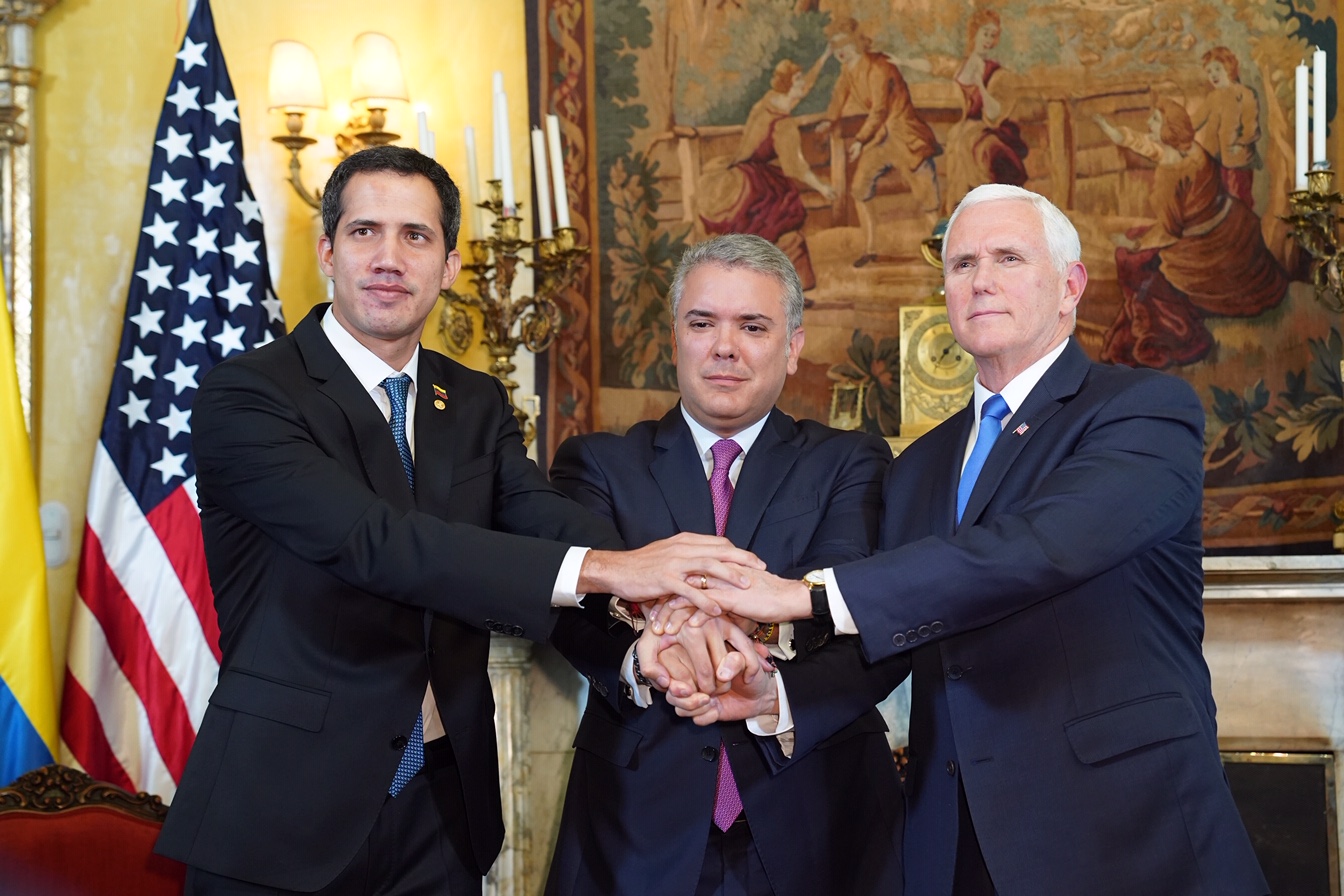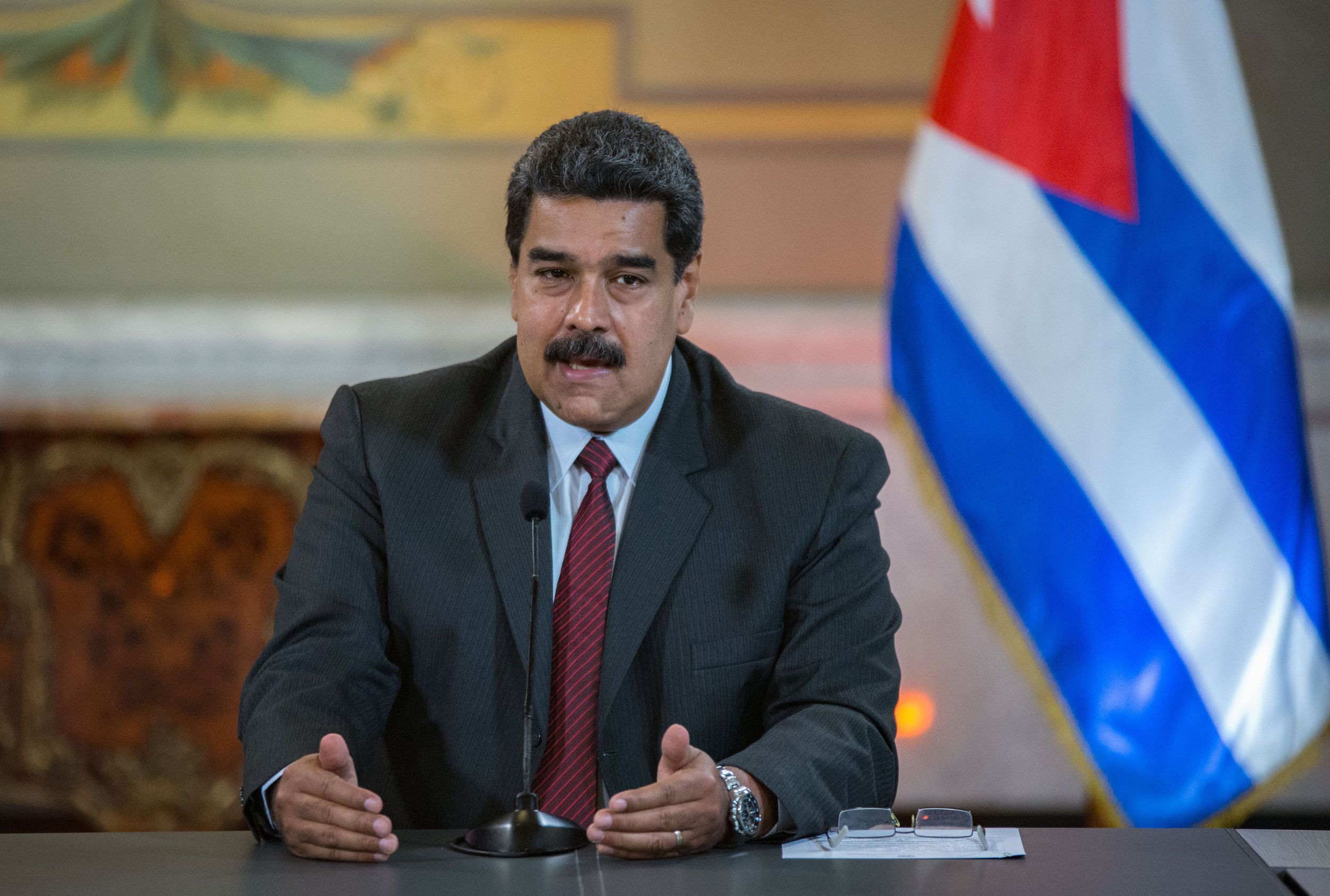PICTURED: Vice President Mike Pence meets with Venezuelan Ambassador for the opposition to the U.S. Carlos Vecchio and Colombia-based Venezuelan opposition-commissioner for Foreign Relations Julio Borges.
WASHINGTON, October 29th, 2019. In a press release from the Senate Committee on Foreign Relations, Idaho Senator and committee chairman Jim Risch (R), and senator Marco Rubio (R – F.L.) chairman of a subcommittee called the “Subcommittee on Western Hemisphere, Transnational Crime, Civilian Security, Democracy, Human Rights, and Global Women’s Issues,” met with four primary members of Venezuela’s opposition party who the United States have supported since the 2018 Venezuelan presidential elections and the following attempt at usurpation and regime change in Caracas by Washington.
UN Ambassador Miguel Pizarro and Ad hoc Director Alejandro Grisanti are both still members of Venezuelan society.
The American senators were also joined by Colombia-based Venezuelan opposition-commissioner for Foreign Relations Julio Borges, a man indicted in the country for conspiring to assassinate Venezuelan President Nicolas Maduro, and Venezuelan Ambassador for the opposition to the U.S. Carlos Vecchio.
Vecchio, a man of ill-repute and ExxonMobil legal warrior, has been fighting against the Chavistas ever since they kicked his bosses out of the Venezuelan petroleum industry more than a decade ago.
“Today we welcomed International Affairs Commissioner Borges and Ambassador Vecchio to discuss a path forward to return democratic rule to Venezuela,” said the senators in the press release “The U.S. has provided more than $400 million in humanitarian aid and taken strong actions to punish individuals and entities responsible for or profiting from the repression and humanitarian tragedy unleashed by the Maduro regime on the Venezuelan people”.
PICTURED: Vice President Mike Pence, President Juan Guaido of Venezuela, and President Iván Duque Márquez of Colombia, Monday February 25, 2019.
Bipartisan propaganda
The entire foundation of the United States foreign policy towards Venezuela and the treatment of the people therein stems from the accusations that the 2018 presidential election was compromised and illegitimate, and that the economic crises in the country was forcibly levied against the citizens as a political act of deprivation.
Even though 50 nations recognize Juan Guaido as the Interim President of Venezuela including the U.S. UK, and France, that doesn’t change the fact that these two claims are so false as to appear transparent.
Observer sites like Electoral Integrity Project site things such as voter disinformation campaigns and low voter turnout as evidence of a contentious election and therefore one that should not be recognized. For a reality check there was 54% voter turnout in the 2012 U.S. Presidential election, and 46% among a Venezuelan population in the jaws of an economic crises.
However a corps of international election observers made up of over 100 political scientists and independent journalists reported the elections were indeed legitimate and that many of the irregularities reported in western media sources were minor and did not constitute any serious infractions on the ability of the Venezuelan population to enact their will democratically.
What’s more likely to explain the 2018 voter turnout was another of the abstention campaigns run by opposition parties like the ones run in the 2006 presidential and the 2005 parliamentary elections.
British Investigative journalist and expert in Venezuela Jeremy Fox, wrote as much regarding the 2018 elections in Venezuela Analysis.
“…the turnout at 46 per cent was dangerously low by Venezuelan standards and has given further impetus to charges both within and beyond the country that the election lacked legitimacy,” Fox writes. “An abstention campaign by the right-wing Democratic Unity Roundtable coalition (MUD) undoubtedly had some negative effect on turnout, but general disaffection with politics and politicians in the face of increasing economic hardship also played a role in discouraging participation, not least because none of the candidates took the trouble to explain how they proposed to pull the country out of its current mess”.
One could make a very strong argument that the low voter turnout in 2016 here stateside was borne of similar dissatisfaction. Coincidentally, both elections in question (U.S. 2016 and Venezuela 2018) represented the lowest turnouts in both countries in 2 decades.
In 2018 the economy of Venezuela was in a shambolic state, with essentials like food, medicine, clean water, and household goods available in increasing scarcity and shortages. This, according to Fox, led to “…casual gun crime, robberies in the street at gunpoint, and ‘express kidnaps’ in which victims are invited to empty their bank accounts in exchange for their lives”.
Bipartisan theft
The U.S. has not provided more than $400 million in humanitarian aid as Senator Risch claims in his press release. Despite being conceived back in April, the bill known as the VERDAD act, (Spanish for truth) was referred to the Foreign Relations Committee after only having been introduced in Congress; passing neither the House nor the Senate.
VERDAD was cosponsored by a number of Democrats and Republicans and introduced by Democratic senator Bob Menendez, who according to Bloomberg was confident that Senator Marco Rubio, who he claimed has the ear of the executive, would be able to ensure its passage through Congress.
Marco Rubio’s sustained interest in America’s interventions in Venezuela seems to be of a cynical nature. Opposition Ambassador to the U.S. Carlos Vecchio, a man who, according to a damning report by the Grey Zone, has made his whole career out of exploiting or attempting to exploit Venezuela’s vast oil reserves for his friends stationed within petro giants Citco and ExxonMobil and within opposition parties within the South American country.
About Vecchio Senator Rubio said “We all know who he is already”. In February of 2019 during Trump’s State of the Union address, Vecchio was seated next to Rubio as a guest of honor.
Rubio’s last few re-election campaigns has seen him receive hundreds of thousands of dollars in contributions from Elliott Management – a fund manager that primarily trades in crude oil. Venezuela’s entire oil reserve is heavy crude, and with American investment in Venezuelan oil zeroed after Chavez nationalized the resource, a reopening would give firms a chance to grab a piece of a market that was cornered by Exxon, Mobil, and Citgo in the 1990s.
However America’s interest in Venezuela’s black gold is not a recent development. Another attempt was made in 2002.
Carlos Vecchio and his close friend and political mentor Elias Santana, founded Ciudadania Activa, a civil association that participated in an April 2002 coup d’etat attempt in which they kidnapped then-president Hugo Chavez and spirited him away to an island. The coup eventually failed, like the recent one attempted by Guaido, due to mass public mobilization.
Chavez, who nationalized the country’s vast oil resources as well as PDVSA, the state-owned oil company that was a partner of Citco in North America, replaced the entire PDVSA board of directors – including a number of Vecchio’s former bosses, shortly before the attempt to overthrow him.
Vecchio worked for PDVSA as a legal analyst and described in his autobiography that he could make 6-times more working as a consultant for Mobil shortly before they merged with Exxon. Leopoldo Lopez, with whom Vecchio started the Popular Will opposition party which Juan Guaido is the chair off, was cut from similar PDVSA cloth, and who, like Vecchio, took up politics after Chavez kicked their employers on both sides of the Gulf of Mexico out of business in Venezuela.
Documents from Wikileaks show that in 2004 Ciudadania Activa received $769,000 from USAID to monitor a referendum to recall President Chavez. The unclassified documents also reveal that half a million dollars were spent supporting opposition political parties and instructing them on how to operate effectively to challenge Chavez in the 2006 elections. VZ Analysis reports 2.3 million over 2 years was given to political opposition.
Beyond this web of petroleum-drenched opposition plotting, another report from the Greyzone demonstrates the degree to which characters like Lopez, Vecchio, and Guaido have regularly embezzled USAID money for to spend on lavish hotels, nightclubs, designer clothing, and jewelry.
It’s remarkable that American public servants like Marco Rubio, Mike Pence, Donald Trump, Jim Risch, and Bob Menendez would ever be caught dead with such brazen and corrupt figures such as Lobez, Vecchio, Guaido, and Borges.
PICTURED: Venezuelan President Nicolas Maduro.
Bipartisan imperialism
World at Large has reported extensively on the detrimental effects of the debilitating U.S. sanctions-turned-embargo that were originally started in 2015 by President Obama, after he declared the economic crises of Venezuela a national emergency under the National Emergency Act without providing any evidence that U.S. national security was threatened in any way.
The corresponding increase in sanctions by Trump this year resulted in what economists at the UN estimated to be likely the extra-judicial cause of 40,000 deaths due to starvation and deprivation.
In a report by Jeffery Sachs, an economist at Columbia University and the UN Sustainable Development Solutions Network, Sachs summarizes that the sanctions, first implanted in 2015, and worsened with the executive orders in 2019, fit the categories of “Collective Punishment” as outlined by the Hague and Vienna international conventions, to which America is a signature.
According to Sachs, they are also illegal under international law and treaties which the US has signed, and would appear to violate US law as well.
As Steve Mnuchin, U.S. Sec. of the Treasury describes “persons… who take concrete and meaningful actions to restore democratic order, refuse to take part in human rights abuses, speak out against abuses committed by the illegitimate Maduro regime, and combat corruption in Venezuela,” shall be exempt from the brutal economic war waged by the Trump and Obama administrations.
However in a country where most industries and sectors are nationalized and centrally planned – typical characteristics of any socialist society, the effects on a population are much greater. For instance if sanctions prevent a hypothetical minister who is appointed by Maduro to ensure Venezuela meets her import quotas on things like penicillin or insulin cannot trade in foreign goods due to U.S. sanctions, you have a situation where very few entities can fill that import void; resulting in severe shortages – of which there currently are in Venezuela.
Furthermore, as much as western media outlets like the New York Times et al. want us to believe Maduro is behind the starvation, voter repression, and deprivation of his people, he’s also doing plenty to try and ease their suffering due to American economic embargos by agreeing to massively imbalanced trade deals with non-aligned states like Russia and Cuba.
Cuban economist Omar Zambrano writes that in exchange for oil, Cuba “provided doctors, sports coaches, and some artisan products, but offered nothing that could mean a real income to the Venezuelan economy,” Zambrano told Diario de Cuba. “They are dollars that did not enter the Venezuelan economy in any way”.
According to the U.S. Office of Foreign Asset Control these goods and the deals facilitating their exchange between the two Caribbean nations “continue to fuel the corruption of Maduro and his associates and help maintain their control over the increasingly impoverished Venezuelan people”.
It would be hard to make an argument that wicker baskets and sports coaches “fuel the corruption of Maduro and his associates”. On the contrary they are far more likely to be the desperate actions of a political figure trying to hold onto power and who has made enemies of the most powerful government in history while attempting to maintain the most dysfunctional economic system in history.
In the recent meeting of the UN General Assembly however, Maduro’s representatives scored victories. His Foreign Minister Jorge Arreaza described Guaido’s ally Julio Borges that was present on his behalf, as a “parallel government” that “nobody invited” circling the UN like “ghosts,” while demeaning Trump for his entirely hypocritical stance on the concept of national sovereignty.
Continue exploring this topic — Venezuelan Government To Charge Opposition With High-Treason Claiming Evidence Of Conspiracy With Exxon Mobil




